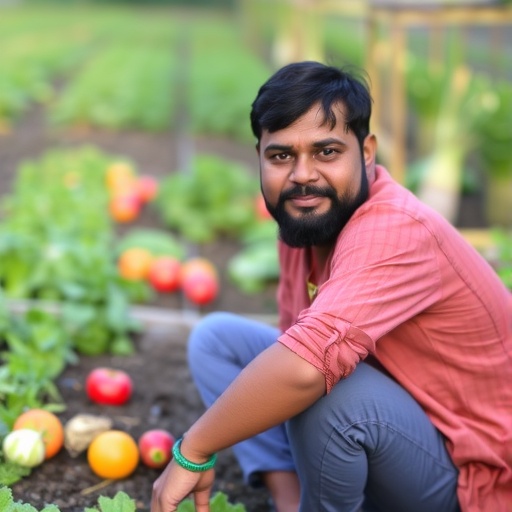In a groundbreaking study published in the journal Discover Agriculture, researchers have explored the perceptions of vegetable farmers regarding sustainable agricultural practices in the Mymensingh district of Bangladesh. This detailed inquiry sheds light on how these farmers adopt and adapt sustainable techniques, revealing crucial insights into their experiences and perspectives which are indispensable for the agriculture sector’s evolution. The need for sustainable practices in agriculture has never been more pressing, given the growing concerns over environmental degradation and food security.
The study, conducted by Hasan, Rahman, and Momin, unveils not just the effectiveness of sustainable practices but also the myriad challenges farmers face as they strive to transition from conventional farming methods. The urgency for this research lies in the increasing impact of climate change on agriculture and the consequent need for farmers to innovate. Agricultural sustainability is not just an academic concept; it has become a palpable necessity for farmers operating under unpredictable weather patterns and fluctuating market demands.
Farmers engaged in vegetable cultivation often find themselves at a crossroads. On the one hand, they are routinely exposed to the benefits of sustainable agricultural methods, which promise improved productivity while preserving natural ecosystems. On the other hand, harmful traditional farming techniques, though familiar and sometimes more straightforward, continue to prevail due to socioeconomic factors. The study emphasizes this dilemma and paints a picture of the broader agricultural landscape faced by these farmers.
One intriguing aspect highlighted by the researchers is the varied effectiveness of different sustainable agricultural practices. Techniques such as crop rotation, organic farming, and integrated pest management have shown promise in enhancing soil health and crop yield. However, the researchers reveal that the level of effectiveness is intricately linked to farmers’ knowledge and experience with these methods. Farmers who have undergone training or have access to reliable information sources tend to achieve better outcomes compared to their less informed counterparts.
Moreover, the study underscores the crucial role of community interaction and farmer networks. In areas where farmers actively share knowledge and resources, sustainable practices tend to flourish. This collective approach often leads to enhanced resilience against market uncertainties as well as climatic challenges. The study advocates for strengthening these community ties to ensure the broader adoption of sustainable practices.
Additionally, the study delves into the challenge of access to resources and technology. The researchers emphasize that limited access to sustainable farming inputs—such as organic fertilizers and pest management tools—can create considerable barriers for smallholder farmers. To facilitate a smoother transition to sustainable farming, initiatives must focus on improving accessibility to these crucial resources.
Collaboration between researchers, government agencies, and non-governmental organizations is also an essential aspect discussed in the study. The researchers advocate for a multi-stakeholder approach to ensure that the insights gathered from this research are translated into actionable strategies. By bridging the gap between research findings and practical applications, there is an opportunity to significantly enhance the sustainable farming landscape in Bangladesh.
Importantly, the study recognizes the cultural dimensions that influence farmers’ practices. Local customs, beliefs, and historical practices shape how farmers view sustainability and its relevance to their work. Engaging with farmers on a cultural level can lead to more effective educational campaigns that resonate with their values and experiences. It’s not merely about teaching a technique but fostering a deeper appreciation for sustainable practices as part of a farmer’s identity.
The enthusiastic responses from the farmers highlighted in the study reflect a significant shift in attitude. Many expressed a desire to learn more about sustainable practices and are eager to partake in training opportunities. This willingness suggests that with the right support systems in place, a widespread adoption of sustainable farming practices is entirely possible. Farmers are recognizing that sustainability can bring long-term benefits, not just for their livelihoods but for the environment as well.
In conclusion, the findings from Hasan, Rahman, and Momin’s research mark a pivotal moment for agriculture in the Mymensingh district. The effectiveness of sustainable agricultural practices as perceived by local farmers illustrates both the potential and the hurdles in transitioning to greener methods of production. The study reinforces the need for collective efforts—researchers, policymakers, and farmers alike—to work in tandem towards sustainable agricultural futures. Strategies focusing on education, financial incentives, community engagement, and cultural sensitivity are vital as we move forward.
The significance of their work cannot be overstated as it provides a comprehensive framework for understanding the dynamics of sustainable agriculture in Bangladesh. This research promises to be a benchmark for future studies and governmental policies aimed at revolutionizing farming practices for a more sustainable and resilient agricultural sector.
Subject of Research: Effectiveness of sustainable agricultural practices as perceived by vegetable farmers in Mymensingh district, Bangladesh.
Article Title: Effectiveness of sustainable agricultural practices as perceived by the vegetable farmers: a study in selected areas of Mymensingh district.
Article References:
Hasan, M.M., Rahman, M.A. & Momin, M.R. Effectiveness of sustainable agricultural practices as perceived by the vegetable farmers: a study in selected areas of Mymensingh district.
Discov Agric 3, 136 (2025). https://doi.org/10.1007/s44279-025-00325-1
Image Credits: AI Generated
DOI: 10.1007/s44279-025-00325-1
Keywords: Sustainable agriculture, vegetable farming, Mymensingh district, farmer perceptions, climate change, community engagement, agricultural practices.
Tags: agricultural sustainability challengesbenefits of sustainable farming methodsclimate change impact on farmingenvironmental degradation in agriculturefood security concernsinnovative farming techniquesMymensingh vegetable farmersperceptions of sustainable agriculturesustainable farming practicestraditional vs. sustainable farming techniquestransitioning to sustainable agriculture





